Artes Visuales
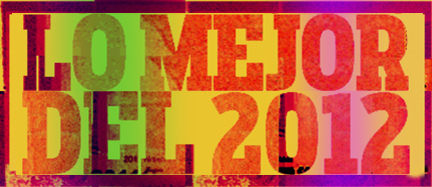 Mucho no le gusta que le digan minimalista, ni ilustrador. Confiesa que es malo dibujando, pero su poder de síntesis lo llevo a la fama efímera de las redes. Este profesional de Adobe, que irrumpió en varios sitios de diseño por sus portadas de discos como "Sgt. Pepper's Lonely Hearts Club Band" o "Dark Side Of The Moon", en enero volvió a ser iluminado por la web cuando acometió con sus versiones chibis de Dark Vader y Mario Bros. El francés Ty Lettau, en un reportaje exclusivo para Visualmente, nos habló de todo esto (otra vez).
Mucho no le gusta que le digan minimalista, ni ilustrador. Confiesa que es malo dibujando, pero su poder de síntesis lo llevo a la fama efímera de las redes. Este profesional de Adobe, que irrumpió en varios sitios de diseño por sus portadas de discos como "Sgt. Pepper's Lonely Hearts Club Band" o "Dark Side Of The Moon", en enero volvió a ser iluminado por la web cuando acometió con sus versiones chibis de Dark Vader y Mario Bros. El francés Ty Lettau, en un reportaje exclusivo para Visualmente, nos habló de todo esto (otra vez). 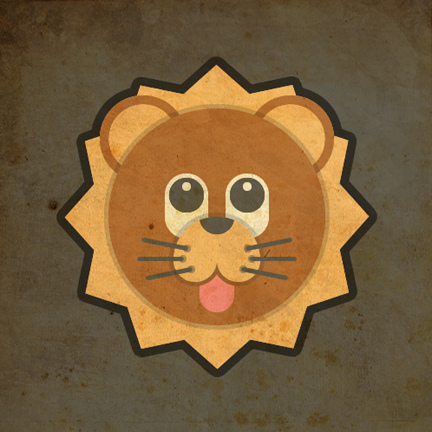
1. How this project is born pop / geek culture illustration?
Well, it started as something different, actually. I did the Animals set first. The original goal was to see how few geometric parts I could use to make an animal face... with the intent of then seeing how few parts I could replace to make a different animal face. I started with a Cat & Dog as my baseline. Then, it became about finding the essence of each animal... that thing that made them unique. So once I had a Cat, I could add stripes to make a Tiger, or spots to make a Leopard. A Horse and a Zebra are the same except for the pattern. And so on.
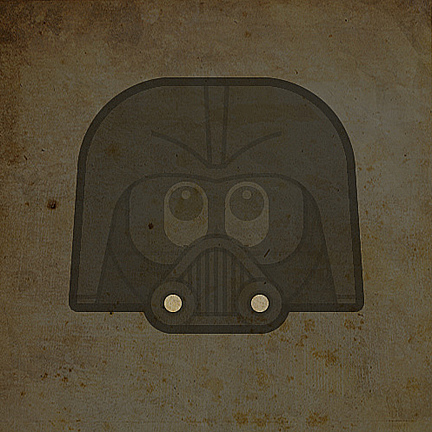
So, once I had the basic building blocks it was easy. I did Star Wars next as a way to challenge my visual system to something beyond animals, and it worked really well. So once that set was done, I just went crazy drawing any pop culture thing that I could think of.
2. I worked to achieve such a synthesis? Which illustration was the most complicated?
The synthesis comes from being really strict about certain details. For example, the eyes very seldom change... and when they do, it is absolutely necessary. There are some basic rules I have for head size, hair size, helmet size. There's some standard parts for things like ears, horns, beards, etc. I have a palette of about 20 colors which everything conforms to. Basically, the amount of variation that is achieved in these illustrations is only possible because of the rigidity of certain parts of the visual system. That really was the entire reason for doing this... to see how many variations I could make with a fairly limited set of parts.
As for which were the most complicated... there emerged a few things that made certain illustrations more difficult.
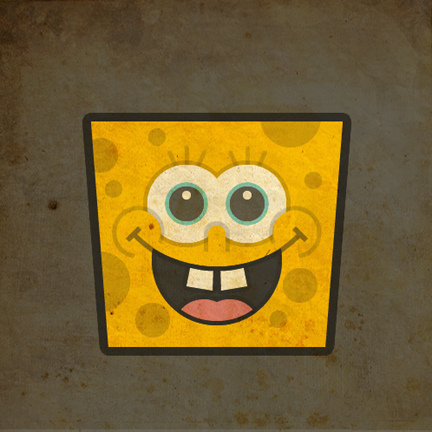
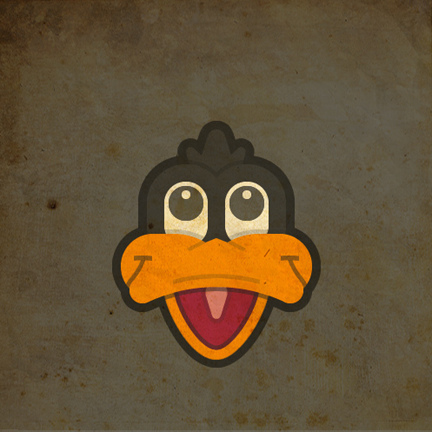
Some were challenging because the original character was already so stylized. Take Spongebob or Daffy Duck. There is only so much you can do to change a character when their shape and style is what identifies them. So I did the best I could at unifying by using my patterns, but with a bunch of new parts. Sometimes it was the proportion or ratio of the original character that caused the problem. Anyone with a tall head or hat was very difficult.
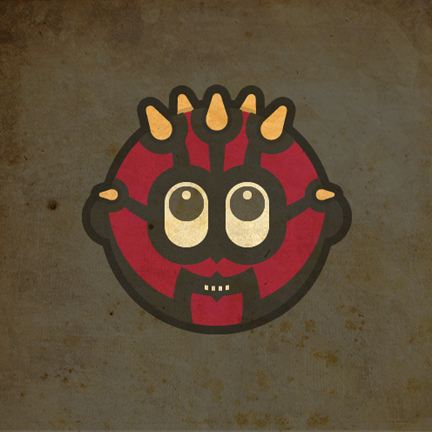
Others were challenging because there was so much detail. For example, Darth Maul has these really elaborate facial tattoos. So how do you simplify that down to basic shapes while still retaining the feel of them? It's actually really difficult to find that balance. But in the end, having too much detail is good, because you have a lot to choose to focus on.
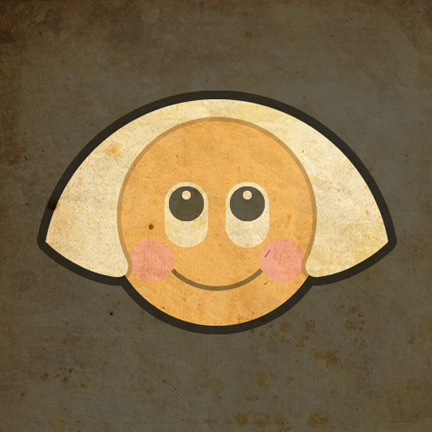
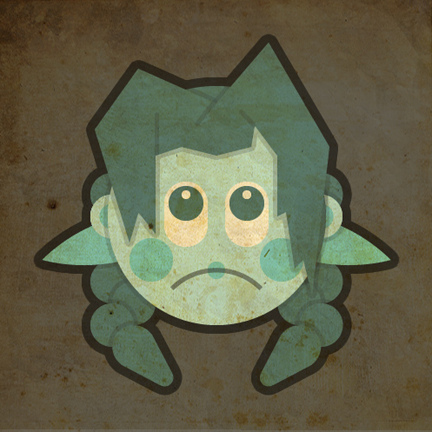
Without a doubt the most challenging ones were when I had virtually no detail to work with. The more non-descript a character is, the harder it is to simplify them down to their essence. No question, the most difficult set overall was the U.S. Presidents. Here we have 43 characters, which save for Barack Obama, are all basically old caucasian guys. They aren't superheroes. They aren't creatures. They are just guys. So the only thing I had to work with was the hairstyle. This led me to a really wonderful little "coding" with this set. Their mouth gesture is code. A sad face meant that they were assassinated. A frown meant someone tried to assassinate them. A smirk meant that they were involved in controversy. You will then notice that these mouth gestures get used elsewhere. For example, Aerith from Final Fantasy was killed, so she has a frown. It became a really fun little detail that was born from a severe limitation.
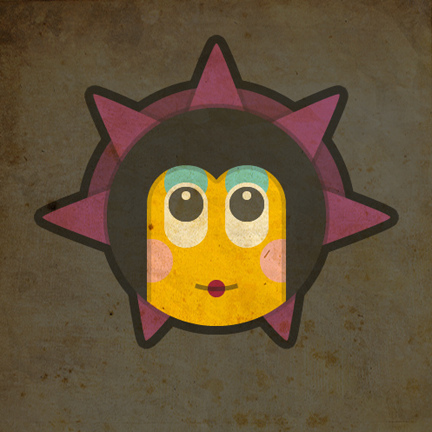
3. What was the criterion for selecting the characters?
I chose sets based on things that I liked. In general, everything I illustrated was something that I personally enjoyed... be it a toy from my childhood or a current TV show. I think the one that was most fun for me was Masters of the Universe, which I did as my fourth set. I had every MotU toy as a kid... and I'm not exaggerating either, I had every one. But, in the end, I had done pretty much everything I could think of anyhow, so the order I chose them didn't much matter.
4. How long it took to do this work?
I did the Animals set in August and the last upload was in November. So, I guess no longer than 3 months to do them all. It got easier and faster as I went on. By the end I had pretty much every part already drawn, so it was just a question of remembering where I had drawn it. I doubt that anyone would ever guess it, but these are all drawn in Adobe Fireworks. Not to sound immodest, but I'd challenge you to find someone who is faster in Fireworks than I am :P So, it just became a really smooth process after a while.
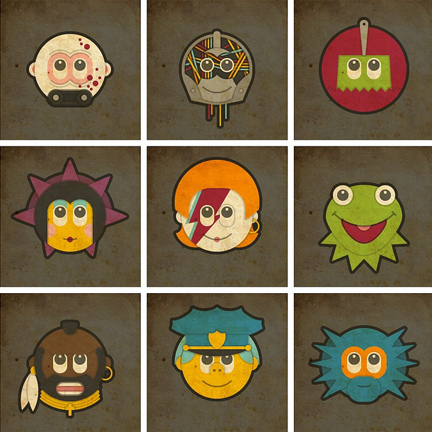
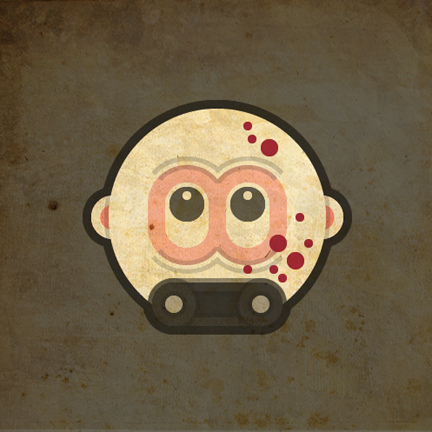
5. What is the picture that you like best? Why?
I have many favorites, which I actually have kept track of over the course of making 1280 of these. But I'll try to respect the spirit of your question and pick just one. So If I had to name just one illustration as the best, I guess I'd go with Anakin Skywalker's Redemption. It's not the most complex one, but this illustration is loaded with subtext. The little mouthpiece element reminds you that this is Darth Vader. It's from an extremely powerful movie scene in which the events of three films culminate in the redemption of the villain. I don't know, I guess this one just tells a story or evokes a memory in the way many of the others do not. And something just makes me chuckle about seeing sad or evil characters looking all cute in these illustrations.
- Lo Mejor 2012: El Inglés Stephen Wildish Hizo Un Alfabeto Con Filmes De Los 60, 70, 80 Y 90
En enero irrumpió en todas las redes una serie de alfabetos iconográficos que venían a representar los filmes clásicos de los 60, 70, 80 y 90. Poca información ofrecían de su autor esos blogs que pretendían mostrar la novedad. Nuevamente, Visualmente...
- Exclusivo: Hablamos Con El Inglés Stephen Wildish
Las redes sociales lo han convertido en la nueva estrella del firmamento web. Es que el diseñador inglés Stephen Wildish tuvo la idea de hacer unos alfabetos donde cada letra coincidía con el nombre de una película de cine moderno. Así uno puede...
- Minimalismo: Hoy. Tom Wahlin
1. How the idea for Music For The Masses? Music For The Masses was a project my senior year of school in advanced typography class. All of the content was provided. The purpose: To create variety while keeping a consistent theme: "Basilica Block Party."...
- Lo Mejor Del 2010: Los Discos Minimalistas De Ty Lettau
Mucho no le gusta que le digan minimalista, ni ilustrador. Confiesa que es malo dibujando, pero su poder de síntesis lo llevo a la fama efímera del bloggismo. Este profesional de Adobe irrumpió en varios sitios de diseño por sus versiones de los...
- Exclusivo: Ty Lettau Nos Habla De Sus Tapas De Discos
Mucho no le gusta que le digan minimalista, ni ilustrador. Confiesa que es malo dibujando, pero su poder de síntesis lo llevo a la fama efímera del bloggismo. Este profesional de Adobe irrumpió en varios sitios de diseño por sus versiones de los...
Artes Visuales
Lo Mejor 2012: Ty Lettau nos muestra sus versiones chibis de Dark Vader y Mario Bros
 Mucho no le gusta que le digan minimalista, ni ilustrador. Confiesa que es malo dibujando, pero su poder de síntesis lo llevo a la fama efímera de las redes. Este profesional de Adobe, que irrumpió en varios sitios de diseño por sus portadas de discos como "Sgt. Pepper's Lonely Hearts Club Band" o "Dark Side Of The Moon", en enero volvió a ser iluminado por la web cuando acometió con sus versiones chibis de Dark Vader y Mario Bros. El francés Ty Lettau, en un reportaje exclusivo para Visualmente, nos habló de todo esto (otra vez).
Mucho no le gusta que le digan minimalista, ni ilustrador. Confiesa que es malo dibujando, pero su poder de síntesis lo llevo a la fama efímera de las redes. Este profesional de Adobe, que irrumpió en varios sitios de diseño por sus portadas de discos como "Sgt. Pepper's Lonely Hearts Club Band" o "Dark Side Of The Moon", en enero volvió a ser iluminado por la web cuando acometió con sus versiones chibis de Dark Vader y Mario Bros. El francés Ty Lettau, en un reportaje exclusivo para Visualmente, nos habló de todo esto (otra vez). 
1. How this project is born pop / geek culture illustration?
Well, it started as something different, actually. I did the Animals set first. The original goal was to see how few geometric parts I could use to make an animal face... with the intent of then seeing how few parts I could replace to make a different animal face. I started with a Cat & Dog as my baseline. Then, it became about finding the essence of each animal... that thing that made them unique. So once I had a Cat, I could add stripes to make a Tiger, or spots to make a Leopard. A Horse and a Zebra are the same except for the pattern. And so on.

So, once I had the basic building blocks it was easy. I did Star Wars next as a way to challenge my visual system to something beyond animals, and it worked really well. So once that set was done, I just went crazy drawing any pop culture thing that I could think of.
2. I worked to achieve such a synthesis? Which illustration was the most complicated?
The synthesis comes from being really strict about certain details. For example, the eyes very seldom change... and when they do, it is absolutely necessary. There are some basic rules I have for head size, hair size, helmet size. There's some standard parts for things like ears, horns, beards, etc. I have a palette of about 20 colors which everything conforms to. Basically, the amount of variation that is achieved in these illustrations is only possible because of the rigidity of certain parts of the visual system. That really was the entire reason for doing this... to see how many variations I could make with a fairly limited set of parts.
As for which were the most complicated... there emerged a few things that made certain illustrations more difficult.


Some were challenging because the original character was already so stylized. Take Spongebob or Daffy Duck. There is only so much you can do to change a character when their shape and style is what identifies them. So I did the best I could at unifying by using my patterns, but with a bunch of new parts. Sometimes it was the proportion or ratio of the original character that caused the problem. Anyone with a tall head or hat was very difficult.

Others were challenging because there was so much detail. For example, Darth Maul has these really elaborate facial tattoos. So how do you simplify that down to basic shapes while still retaining the feel of them? It's actually really difficult to find that balance. But in the end, having too much detail is good, because you have a lot to choose to focus on.


Without a doubt the most challenging ones were when I had virtually no detail to work with. The more non-descript a character is, the harder it is to simplify them down to their essence. No question, the most difficult set overall was the U.S. Presidents. Here we have 43 characters, which save for Barack Obama, are all basically old caucasian guys. They aren't superheroes. They aren't creatures. They are just guys. So the only thing I had to work with was the hairstyle. This led me to a really wonderful little "coding" with this set. Their mouth gesture is code. A sad face meant that they were assassinated. A frown meant someone tried to assassinate them. A smirk meant that they were involved in controversy. You will then notice that these mouth gestures get used elsewhere. For example, Aerith from Final Fantasy was killed, so she has a frown. It became a really fun little detail that was born from a severe limitation.

3. What was the criterion for selecting the characters?
I chose sets based on things that I liked. In general, everything I illustrated was something that I personally enjoyed... be it a toy from my childhood or a current TV show. I think the one that was most fun for me was Masters of the Universe, which I did as my fourth set. I had every MotU toy as a kid... and I'm not exaggerating either, I had every one. But, in the end, I had done pretty much everything I could think of anyhow, so the order I chose them didn't much matter.
4. How long it took to do this work?
I did the Animals set in August and the last upload was in November. So, I guess no longer than 3 months to do them all. It got easier and faster as I went on. By the end I had pretty much every part already drawn, so it was just a question of remembering where I had drawn it. I doubt that anyone would ever guess it, but these are all drawn in Adobe Fireworks. Not to sound immodest, but I'd challenge you to find someone who is faster in Fireworks than I am :P So, it just became a really smooth process after a while.


5. What is the picture that you like best? Why?
I have many favorites, which I actually have kept track of over the course of making 1280 of these. But I'll try to respect the spirit of your question and pick just one. So If I had to name just one illustration as the best, I guess I'd go with Anakin Skywalker's Redemption. It's not the most complex one, but this illustration is loaded with subtext. The little mouthpiece element reminds you that this is Darth Vader. It's from an extremely powerful movie scene in which the events of three films culminate in the redemption of the villain. I don't know, I guess this one just tells a story or evokes a memory in the way many of the others do not. And something just makes me chuckle about seeing sad or evil characters looking all cute in these illustrations.
- Lo Mejor 2012: El Inglés Stephen Wildish Hizo Un Alfabeto Con Filmes De Los 60, 70, 80 Y 90
En enero irrumpió en todas las redes una serie de alfabetos iconográficos que venían a representar los filmes clásicos de los 60, 70, 80 y 90. Poca información ofrecían de su autor esos blogs que pretendían mostrar la novedad. Nuevamente, Visualmente...
- Exclusivo: Hablamos Con El Inglés Stephen Wildish
Las redes sociales lo han convertido en la nueva estrella del firmamento web. Es que el diseñador inglés Stephen Wildish tuvo la idea de hacer unos alfabetos donde cada letra coincidía con el nombre de una película de cine moderno. Así uno puede...
- Minimalismo: Hoy. Tom Wahlin
1. How the idea for Music For The Masses? Music For The Masses was a project my senior year of school in advanced typography class. All of the content was provided. The purpose: To create variety while keeping a consistent theme: "Basilica Block Party."...
- Lo Mejor Del 2010: Los Discos Minimalistas De Ty Lettau
Mucho no le gusta que le digan minimalista, ni ilustrador. Confiesa que es malo dibujando, pero su poder de síntesis lo llevo a la fama efímera del bloggismo. Este profesional de Adobe irrumpió en varios sitios de diseño por sus versiones de los...
- Exclusivo: Ty Lettau Nos Habla De Sus Tapas De Discos
Mucho no le gusta que le digan minimalista, ni ilustrador. Confiesa que es malo dibujando, pero su poder de síntesis lo llevo a la fama efímera del bloggismo. Este profesional de Adobe irrumpió en varios sitios de diseño por sus versiones de los...
